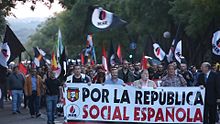The US FDA’s proposed rule on laboratory-developed tests: Impacts on clinical laboratory testing
Contents
Republican Social Movement Movimiento Social Republicano | |
|---|---|
 | |
| Secretary | Antonio Martínez Cayuela |
| Founded | 1999 |
| Dissolved | 2018 |
| Ideology | Republicanism[1] Neo-fascism[2] |
| Political position | Far-right |
| Party flag | |
 | |
| Website | |
| www.msr.org.es | |

The Republican Social Movement (Spanish: Movimiento Social Republicano, MSR) was a far-right political party in Spain. It was registered at the Ministry of Interior on November 30, 1999, with offices in Barcelona. The following year it merged with Vértice Social Español to form what it called a "Social Patriotic Force".
By its members' own admission, as well as by that of the bulk of the far-right public opinion,[3] the MSR was roughly inscribed in what is usually called the Third Position, and adheres to the commonplace strategy of defending socializing (and at times leftist) doctrines abroad, whereas adopting conservative and anti-immigration stances at a domestic level. [citation needed] Its slogan was 'Spain-Republic-Socialization'.
In the VII National Congress all the participants decided to terminate the movement's experience. MSR dissolved itself with an official announcement 30 of January 2018.[4]
Policies
The party has campaigned against immigration into Spain, Turkish membership of the European Union and global capitalism. They support a large programme of re-nationalisation of industries such as electricity and transport. In terms of foreign policies the party takes a strongly pro-Palestinian approach to the Middle East question, criticising Israel alleging that the "Zionist army are committing daily crimes against the Palestinian people." In addition to supporting the Venezuelan government of Hugo Chavez, they have also called for the withdrawal of Spanish troops in the Balkans and condemned the American led invasion of Iraq. In the 2000 General Election the party supported the platform of España 2000.
Press
The party publishes Tribuna de Europa and Libertad.
Sectoral organizations
- Labour: Unión Sindical de Trabajadores - UST
- Youth: Liga Joven
- Ecology: Hispania Verde
- Think-tank: Alternativa Europea
- Culture: Círculo de Estudios La Emboscadura - CELE
Elections results
Congress of Deputies / Senate
| Election | Congress of Deputies | Senate | Rank | Government | Leader | |||||
|---|---|---|---|---|---|---|---|---|---|---|
| Votes | % | ±pp | Seats won | +/− | Seats won | +/− | ||||
| 2004 | 6,768 | 0.03% | 0 / 470
|
±0 | — | — | #36 | No seats | ||
European Parliament
| Election year | # of total votes | % of overall vote | # of seats won | Rank |
|---|---|---|---|---|
| 2009[5][6] | 6,009 |
0.04% |
0 / 12
|
26 |
| 2014[7][8] | 8,909 |
0.06% |
0 / 12
|
31 |
References
- ^ "Estatutos del Movimiento Social Republicano". www.msr.org.es. Archived from the original on 3 May 2010. Retrieved 6 June 2022.
- ^ Gonzalo Duñaiturria Laguarda (2017). ANALISIS DE LAS CAUSAS DE LA IRRELEVANCIA DE LA DERECHA RADICAL POPULISTA EN ESPAÑA (1978-2015). UNA EXCEPCION EN EL CONTEXTO POLITICO EUROPEO (PDF). p. 171.
- ^ "Frente Patriota". Archived from the original on 2005-03-21.
- ^ title = Official communique of Republican Social Movement|https://movimientosocialrepublicano.wordpress.com/
- ^ "Electoral Results Consultation. European Parliament. June 2009. National totals". infoelectoral.mir.es (in Spanish). Ministry of the Interior. Retrieved 24 September 2017.
- ^ "European election 7 June 2009". historiaelectoral.com (in Spanish). Electoral History. Retrieved 24 September 2017.
- ^ "Electoral Results Consultation. European Parliament. May 2014. National totals". infoelectoral.mir.es (in Spanish). Ministry of the Interior. Retrieved 24 September 2017.
- ^ "European election 25 May 2014". historiaelectoral.com (in Spanish). Electoral History. Retrieved 24 September 2017.
Bibliography
- Büttner, Frauke (2011). Right-wing extremism in Spain: Between parliamentary right-wing extremism in Spain: Between parliamentary insignificance, far-right populism and racist violence (PDF). Friedrich-Ebert-Stiftung, Forum Berlin. p. 181. ISBN 978-3-86872-617-6. Retrieved 2014-04-03.

















